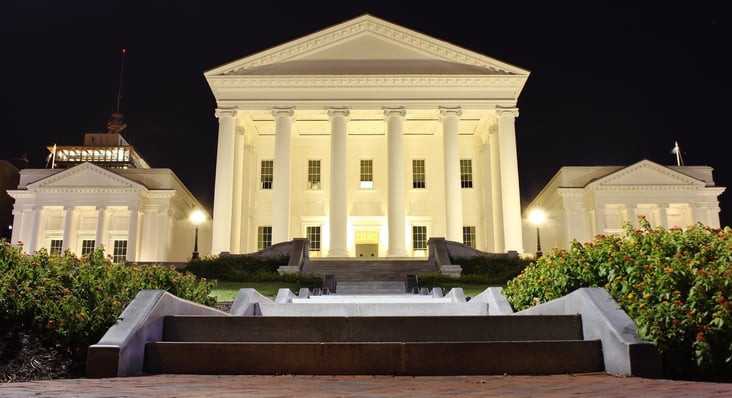
While the nation’s eyes may be turned to Washington, D.C., this week for the inauguration, there is action just 109 miles south on I-95 in Richmond. The Virginia General Assembly gaveled into session last Wednesday, and there is a full slate of the bills that could impact the advanced energy industry. Last year, we noted that the sign on the door of a state that prides itself on being “open for business” could have read “gone fishing” when it comes to the advanced energy industry. But the slogan this year could be “under construction.” Here are three questions that will determine which message Richmond will be sending to the advanced energy industry in 2017:
Can the Rubin Group Deliver?
Last year, all bills related to electricity were placed into a committee for study over the summer. This process essentially killed the bills for the 2016 session, but spawned a group – with support of Commerce and Labor Chairman Sen. Frank Wagner – that brought together some members of the solar industry and utilities, with Mark Rubin, director of the Virginia Center for Consensus Building, serving as moderator. After months of private meetings, the group circulated drafts of four bills in December covering key areas: community solar, margin on Power Purchase Agreements (PPAs), permit by rule process, and agricultural net metering.
The community solar legislation (SB 1393) would establish a three-year pilot program in the service territories of Dominion and Appalachian Power, Virginia’s two major utilities. The bill keeps both the project and program size small, limiting the market impact for the industry. Also, the bill would allow the utilities would retire the Renewable Energy Certificates (RECs) rather than customers, which is a cause for concern (more on this below). But the bill does provide an early foothold for community solar projects in Virginia, which could build into a robust market over time.
SB 1388 and SB 1395 would help large scale renewable projects in Virginia by giving utilities a rate of return for purchasing power from third-party developers under PPAs equal to that of utility-owned generating facilities, and amending a regulatory process – known as Permit By Rule (PBR) – to streamline development.
Lastly, SB 1394 would amend the agricultural net metering laws by increasing the size of allowable projects, among other things.
Each of the bills emerging from the Rubin Group will likely be amended prior to passage, or carried over into 2018. Ultimately, observers and advocates will be watching to see whether the Rubin Group process proves to be a success.
Are Corporate Purchasers Welcome in Virginia?
AEE members Amazon and Microsoft made headlines in 2016 through renewable energy agreements struck with Dominion, as the utility’s showed its willingness to work with big customers to bring more renewables onto the grid. On top of that, a group of 18 companies last year, including several AEE members, signed a letter calling for an explicit legal framework that would make energy procurement options more widely available.
The community solar program proposed by the Rubin Group could be one way to offer up renewable energy to corporate purchasers, but not as proposed. As mentioned, the utilities would retire RECs on behalf of customers, but most corporate buyers want to retire RECs themselves, to fulfill corporate sustainability commitments. Additionally, a small, three-year pilot program does not do much for business customers either.
Another bill, HB 1800, would give commercial and industrial customers with the right to enter into PPAs for onsite installations, providing clarity in the statute and one desirable option for corporate purchasers.
Will Virginia Embrace Energy Efficiency?
Last year, there were several attempts to move energy efficiency forward in Virginia. These efforts primarily focused on modernizing the cost-effectiveness screening for efficiency, and providing an incentive for utilities to increase investment in efficiency, with a review of evaluation, measurement, and verification (EM&V) protocols gaining legislative approval.
This year, two bills to take energy efficiency further are before the legislature. HB 1465 would require an annual report to track the Commonwealth’s progress toward its energy reduction targets. Currently, there is no mechanism to track energy savings under Virginia’s voluntary energy efficiency goals. HB 1712 would authorize public entities to work with energy service companies to enter into performance contracts under a cooperative procurement process. Currently, an administrative burden effectively blocks state and local entities from using this financing mechanism to save money in building energy use.
The General Assembly is only in session for 45 days in 2017, so we will have answers to these questions in short order. Here’s hoping that the legislature is ready to advanced energy as a priority in Virginia.
Keep up to date on all advanced energy news and policies by subscribing to our newsletter below:
